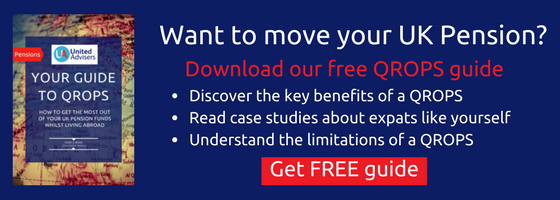Already we’ve seen media reports about an increasing number of expats, and those considering retiring outside the UK, looking to move their retirement funds into secure and regulated jurisdictions elsewhere. The main trigger for this recent increase is the plummeting pound following the Brexit decision.
It’s only natural that people living in the EU and receiving a UK pension are nervous; after all, a falling pound means a higher cost of living. At the same time, people want to safeguard their retirement funds, however, decisions about transferring pension funds from one jurisdiction to another must be carefully considered.
For Expats, or someone considering retiring outside the UK, there are additional factors to consider, like:
- Where exactly you want to retire
- Exchange rates between the pound and the currency where you’ll reside;
- The stability of that country’s exchange rate.
Amongst the options available to expats are Self Invested Personal Pensions (SIPP) and Qualifying Recognised Overseas Pension Schemes (QROPS)
SIPPs
In short, a SIPP is a ‘do-it-yourself’ pension remaining under UK legislation that allows you to make your own investments into a personal pension pot. They are great for:
- Pulling several personal pensions together
- Holding a wide variety of investments including shares and commercial property
- Giving you day-to-day control over the ‘big picture’ such as moves from shares to cash or vice versa
QROPS
A QROPS is also great for these things but is different from the SIPP because it is an overseas pension scheme that can receive authorised transfers from UK pension arrangements.
Among the many benefits of both a SIPP and a QROPS is mitigation against currency fluctuations that can negatively affect retirement income. With both schemes, you can invest in assets denominated in most currencies and receive benefit payments in the currency appropriate to your current situation.
Additionally, a QROPS provides benefits like the ability to fully pass on funds to named beneficiaries after death (after five full years of non-UK residence) and the possibility to minimise applicable UK taxes. This means there is greater investment flexibility and freedom.
In summary, your financial situation is more predictable, consistent and secure – a welcome relief for expats.
Brexit impact
So, what does this all have to do with Brexit? Given the lack of clarity surrounding exactly when and how the UK will exit the EU, it’s likely there is likely to be a rapid short-term increase in the number of expats.
People already considering retiring to countries like France and Spain may make the move sooner rather than later. For this reason, the demand for QROPS is set to dramatically increase.
After Brexit, it’s not surprising many expats are concerned and confused, and find it difficult to decide how to understand and manage pension funds, and plan for retirement. There are benefits to having either a SIPP or QROPS. Of course, it depends entirely on your personal circumstances and what gives you the best possible outcome in achieving what you want with your money.
Pension planning doesn’t have to be complex.
Our trusted advisors, can work with you to explain the benefits and provide impartial advice about SIPPs and QROPSs, so that you better understand what meets your needs.
If you would like to talk confidentially to someone about your pensions options, speak to a member of our Wealth Management team.





